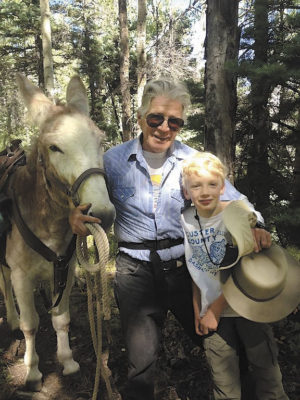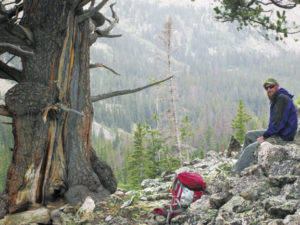By George Sibley
I’ll say upfront that this is not just another anti-Trump screed. Like him or not – and I don’t – the real challenge today, I think, is to figure out how we are going to get back to addressing the very real problems facing the whole planet, toward which The Donald is mostly a lump of obfuscation or outright denial. And we are surely not going to get anywhere at all if we continue to let him dominate our attention, pimping us daily into paroxysms of righteous wrath or gleeful rubber-stamping. The Donald knows the magician’s art of distracting with the left hand to cover what the right hand is doing.
What we really need to be talking about are the challenges the president wants to divert us from, like the transition from an energy dependence on fossil fuels toward a catalog of alternatives – a transition mandated by good news and bad: the bad news being that fossil fuels are pushing the global climate into changes unhealthy for the human species. And, that being the bad news, it’s sort of good news that fossil fuels are finite and eventually we’ll run out. The “frackable fuels” industry operating in Colorado makes claims about eternal supply, but the International Energy Agency projects that those more expensive resources will peak in the early 2020s.
That energy transition, if pursued seriously, would provide decades of meaningful work for millions of people, which is another major challenge – not just McJob jobs to boost consumption, or nostalgic 1950s jobs like Trump promises, but jobs that move us toward a more sustainable future. And that would help with another major challenge: the restoration of the socioeconomic equity among classes that we were actually achieving in the 1960s and 70s, prior to the “Reagan Revolution” – a task which Trump and his gold-plated cabinet have neither the will nor the smarts to address, despite vague campaign promises.
Internationally, it is fine to want to evaluate international trade treaties and security alliances, but with the goal of improving them, not eliminating them, given their success in reducing international bellicosity over the past 70-plus years. It is also fine to be careful about immigrants, but when stringent reviews are already in place, it is economically as well as morally wrong to eliminate the benefits that desperate and grateful immigrants bring to the society.
Those are major challenges we need to be addressing, rather than national debates about whether life begins in week 1, 20 or 24; or about 30-foot walls that will force the desperate to find shovels; or about the sex lives of nonheterosexuals.
Which brings me back to the original question: where, when and by whom are we going to start getting serious about the sustainable future of human life on earth? It is becoming clear that Trump hasn’t got much of a clue about addressing any of our real problems, and it’s foolish to think it would have been better if Clinton were in the Oval Office because the Congressional Republicans would have slid right back (probably with relief) into their comfortable role as scorched-earth obstructionists. The imperial ship of state has gone from a limping forward crawl to basically dead in the water at the moment; the best we can hope from our federal government right now is “do no damage.”
I’m trying to figure out where and how Central Colorado fits into all this. As noted a couple months ago here, Central Colorado split pretty evenly in the popular vote between Trump and Clinton, just like the state and the nation at large. But the votes were not spread evenly over the region. The towns and cities in Central Colorado favored Clinton, heavily in some cases, and the non-urban precincts favored Trump, creating an archipelago of densely populated blue islands in a sparsely settled red sea.
This also matched the state and national picture. There are interesting maps on the internet showing “Trump’s America” and “Clinton’s America” – maps that delineate the heavily populated islands of urban America that carried the popular vote, in the thinly populated sea of rural America that carried the electoral college.
What is interesting about this is that the cities of America are the only place where there is any real energy for addressing the challenges cited above. Since the 1930s, most American cities have belonged to a U.S. Conference of Mayors, which began primarily as a lobbying group in Washington and state capitols. But in the 1990s – representing some 1,400 cities of 30,000 or more and some smaller “service cities” – the Conference of Mayors began to take its own course, picking up the federal slack in addressing, first, energy issues, then the related climate change challenge that Republicans won’t touch.
Now, recognizing the economic impact of immigrants on their economies, many of these cities are now “sanctuary cities,” refusing to commit their law enforcement agencies to assisting in federal sweeps of undocumented workers (“criminal aliens” to The Donald), and otherwise advocating for that valuable resource.
A similar organization of urban leaders has organized in the European Union, and now those two organizations, with other urban leaders around the world, have organized a “Global Parliament of Mayors,” with the same basic mission: let the national governments fiddle with populist xenophobia and medieval attitudes about women and homosexuals; Rome cannot afford to sit by and docilely burn, and is picking up the reins of responsibility for the future, with associated powers.
This has been described as a “devolution revolution,” a process – not automatically revolutionary – whereby one level of government passes some power down to a lower level of government. When Reagan and then Clinton gave the states more control over welfare policy, that was devolution. But “devolution revolution” occurs when a lower level of government simply picks up additional powers that have been essentially abandoned or ignored by the higher level.
The strange tension this can cause is almost mythically represented by the state of Oklahoma. Oklahoma’s Republican Attorney General Scott Pruitt has just taken over the federal Environmental Protection Agency, an organization whose powers he has pledged to effectively eliminate. But the Republican Mayor of Oklahoma City, Mick Cornett, is current president of the U.S. Conference of Mayors and is on the Steering Committee of the Global Parliament of Mayors: a Republican committed to facing reality and responsibility, even if it pits him against the nation-state run by ideologically-driven Republicans.
[InContentAdTwo] And I return to my question: where is Central Colorado in all this? It is in the core of mountain Colorado culture to be suspicious at best of both Denver and Washington – the city-state and the nation-state. Here in the Upper Gunnison River Basin, the nation-state manages 85 percent of the land in our valley. Most of us concede that this is more of a blessing than a curse, but the management is often dictated by top-down policies or constraints more driven by ideological Washington vagaries than down-on-the-ground realities.
The relationship with Denver is more complex. We resent the relentless growth of the Front Range megalopolis – but it is a resentment tinged with both envy (spread the wealth, dammit) and relief (better there than here). We don’t want to give them any more of “our” water – but have to concede that, since the Two Forks veto and the passing of Glenn “Darth Vader” Saunders, Front Range utilities have been willing to invest in quite a bit in otherwise unaffordable Western Slope water management projects and programs in exchange for little bits of additional water. There’s the further, kind of embarrassing, fact that virtually everything other than water we need to keep going here – food, energy, power, goods and services – come from or through Denver.
And on a deeper level, we have to hope that the urbanization project will ultimately succeed – now in its sixth millennium of trying to figure out what do with the swarming human population. Either we figure out how to make cities work in giving humans meaningful lives, or the cities will die and empty their people into the countryside (theme of many a current dystopian novel), and we will not like that at all.
I can’t help but feel that we are coming down to a difficult choice: where do we declare our allegiance? Is it to be the nation-state and my country right or wrong, or the “devolution revolution” with the city-states? I confess to being moved by words like these, from Global Parliament organizer Benjamin Barber:
Seen from a global historical perspective, the disconcerting truth is that Donald Trump and his voters are sailing not merely in the face of the winds of change but against history’s dominant trends: global demographics are against him, as are American demographics; the reality of urbanization is against him; the mobility of peoples is against him; and the growing dysfunction of national sovereignty on an irreversibly interdependent planet is against him. In this world without borders, where no one nation can solve global problems alone and walls are not so much malevolent as irrelevant, the cosmopolitan voice is also history’s voice – reality’s voice – and a viable American voice, too. It represents a majority of the world’s population, four-fifths of its GDP, and speaks for our inexorable urban destiny. We cannot allow it to be lost in the noise of parochial national xenophobia …
Like Springsteen says: “The country we carry in our hearts is waiting.” But where exactly?
George Sibley writes and waits in the Upper Gunnison River valleys.



